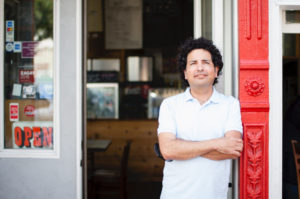Thanks to CDC Small Business Finance for sharing Daniel’s story!
 In the fallout of the 2008 Great Recession, Daniel Palacios — then a real estate investor in San Diego — wanted to reinvent himself in another industry. During this phase, Palacios recalled the hearty stuffed pizzas he regularly craved from establishments like Zachary’s when he studied at UC Berkeley. Then it dawned on him: There was nothing quite like it in San Diego.
In the fallout of the 2008 Great Recession, Daniel Palacios — then a real estate investor in San Diego — wanted to reinvent himself in another industry. During this phase, Palacios recalled the hearty stuffed pizzas he regularly craved from establishments like Zachary’s when he studied at UC Berkeley. Then it dawned on him: There was nothing quite like it in San Diego.
In 2009, he decided to bring this style of pie to Southern California while paying homage to the Bay Area. This led to the creation of Berkeley Pizza. Rather than opening up a traditional pizzeria, Palacios shrewdly started small to test the waters. He rented kitchen space part-time from a restaurant that closed for the evening. At that point, customers could only get Berkeley pizzas one of two ways: pickup or delivery from the rented location, or at San Diego’s Little Italy Mercato, a 200-vendor farmers market held every Saturday.
The praise rolled in hot. Yelpers, farmers market clientele, and the media all adored the Berkeley Pizza’s high-quality, yet affordable pies. “If you’re going to start a restaurant definitely take your product to the farmers market first to get feedback and see how things go,” Palacios told CDC. In 2010, widely read foodie blog Serious Eats urged diners to: “Get yours while it’s still within best-kept-secret territory.”
The testing period turned out to be a success. Armed with the positive reviews, Palacios shortly after secured leased space in San Diego’s Gaslamp district to house Berkeley Pizza. He picked the downtown area as his flagship to capitalize on its bustling foot traffic and hungry, late-night crowd. That strategy worked so well that a few years later Palacios already contemplated launching an outpost.
 Around this time, he discovered that community lender CDC Small Business Finance issued affordable SBA loans. He ended up obtaining the financing needed to open up his second location, a 1,500-square-foot commercial space in the thick of hipster haven North Park. The loan covered costs like tenant improvements, a walk-in cooler, and other equipment. A second site, which debuted in 2014, seemed inevitable. But the loan helped speed up growth, Palacios said. Working with CDC “turned out to be a great way to get a small business loan,” he added.
Around this time, he discovered that community lender CDC Small Business Finance issued affordable SBA loans. He ended up obtaining the financing needed to open up his second location, a 1,500-square-foot commercial space in the thick of hipster haven North Park. The loan covered costs like tenant improvements, a walk-in cooler, and other equipment. A second site, which debuted in 2014, seemed inevitable. But the loan helped speed up growth, Palacios said. Working with CDC “turned out to be a great way to get a small business loan,” he added.
In 2017, after years of steady growth, Daniel found himself restrained by payments he was making on high-interest loans and credit cards. Palacios then reconnected with CDC and got in touch with Ray Hivoral, an in-house small business advisor. Hivoral is part of a team that offers pre- and post-loan assistance to potential and existing CDC clients, from business-plan writing to balance-sheet analysis, all on the house. The team’s aim is to increase their clients’ odds of business success, at no cost. In Palacios’ case, Hivoral gave Berkeley Pizza’s financials a thorough look to identify strengths and weaknesses. “I was impressed with Hivoral’s command of numbers and his ability to analyze my situation,” Palacios said.
“In terms of my business’ strength on paper,” he continued, “I initially thought my balance sheet was so-so, but in working with Hivoral I learned that some of the leasehold improvements I had made were more accurately categorized as long-term assets.” Making that balance-sheet change alone gave Palacios the leverage to apply for a $100,000 SBA loan. The loan helped him refinance his expensive debt from an online-only lender and provide him access to more working capital.
Palacios anticipates the move will save him several hundred dollars a month. He hopes to reinvest those savings into the business and support further growth.
